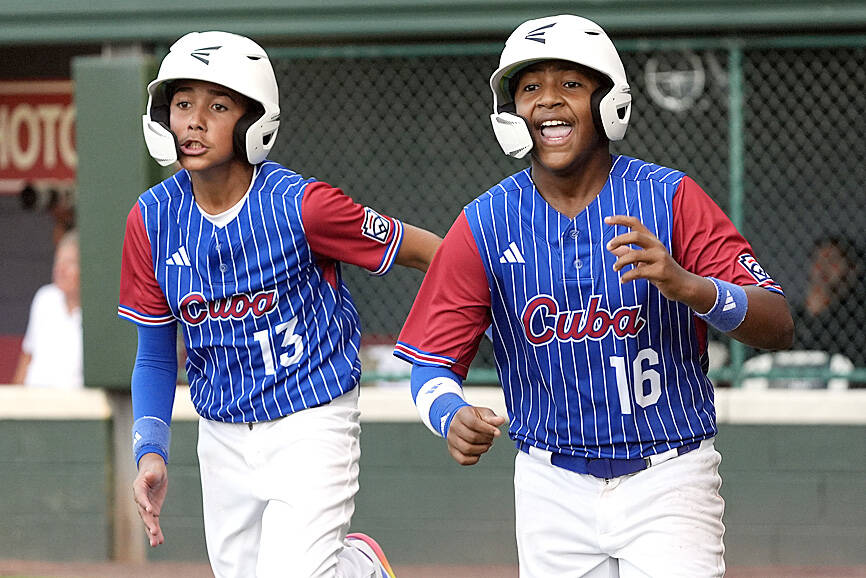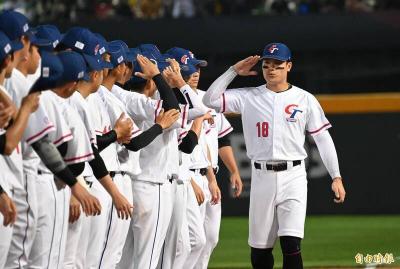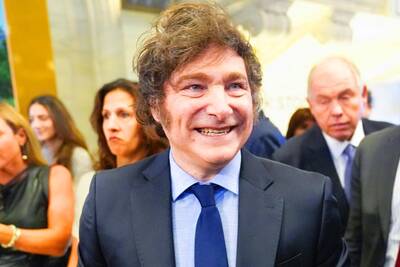Marloon Herrera was crying — happy tears.
With Cuba trailing in the fifth inning of its Little League World Series (LLWS) opener on Thursday, Herrera lined a two-run double to give his team the lead. When the Czech Republic, representing Europe-Africa, made a pitching change, he ran over to give his third base coach a hug.
Cuba went on to win 4-1. It was the first game at this year’s tournament for both sides, but it was also the beginning of Cuba’s second appearance in the series ever — and it was emotional.

Photo: AP
“You breathe baseball in Cuba,” manager Everaldo Machado said on Friday through an interpreter, reflecting on the win and the journey of the team from Santa Clara Little League.
Little League and Cuban baseball officials established a partnership in 2019, clearing the way for Cuba to send teams to the LLWS this year and last year, when a club from Bayamo had a tough ride, suffering one-run losses to Japan and Panama sandwiched around a win over Australia.
No wonder Cuban closer Yans Espinosa celebrated the final out on Thursday — a strikeout looking — by spiking his glove like Shohei Ohtani did after striking out Mike Trout in last year’s World Baseball Classic. In left field at Volunteer Stadium, Herrera fell to his knees.
“I knew it was important, it was an important game for the team,” Espinosa said through an interpreter.
The team is taking in the whole LLWS experience. It attended Venezuela’s 10-0 victory over Mexico on Friday afternoon, sitting just two rows in front of the team they defeated the day before. Japan’s club separated them. The Cuban and Japanese players exchanged fist bumps and high-fives as they sat down.
“They know that this is like a field of dreams, and it’s like a party for them,” Machado said.
Traveling 2,102km from their hometown of Villa Clara to South Williamsport, Machado said there was pressure at the start of the team’s opener before the 11 and 12-year-old players eventually settled into the atmosphere.
A crowd of Cuba fans cheered proudly in the stands just above the dugout. While most of the players’ parents did not make the trip to Pennsylvania, they have been paying close attention.
“The phones don’t stop,” Machado said. “It’s something fundamental, you know, they need that support.”
Villa Clara is a small town where baseball and family are staples of the community. Starting pitcher Deivy Hernandez and Espinosa were initially introduced to the game by relatives.
“My uncle took me to a baseball field and I met a coach there and asked permission so I could practice,” Hernandez said. “From that point on, I’ve just loved baseball.”
The Cuban manager said keeping that passion and the laughs going off the field are the keys for his team — winning is an added bonus.
That attitude could come in handy for Cuba’s next game today against Taiwan, which shut out Canada and Australia in its first two games by a combined score of 19-0.
“They need to keep on playing with no pressure,” Machado said. “Just thinking to have fun, and that’ll be something important just to move on.”

The qualifying round of the World Baseball Classic (WBC) is to be held at the Taipei Dome between Feb. 21 and 25, Major League Baseball (MLB) announced today. Taiwan’s group also includes Spain, Nicaragua and South Africa, with two of the four teams advancing onto the 2026 WBC. Taiwan, currently ranked second in the world in the World Baseball Softball Confederation rankings, are favorites to come out of the group, the MLB said in an article announcing the matchups. Last year, Taiwan finished in a five-way tie in their group with two wins and two losses, but finished last on tiebreakers after giving

North Korea’s FIFA Under-17 Women’s World Cup-winning team on Saturday received a heroes’ welcome back in the capital, Pyongyang, with hundreds of people on the streets to celebrate their success. They had defeated Spain on penalties after a 1-1 draw in the U17 World Cup final in the Dominican Republic on Nov. 3. It was the second global title in two months for secretive North Korea — largely closed off to the outside world; they also lifted the FIFA U20 Women’s World Cup in September. Officials and players’ families gathered at Pyongyang International Airport to wave flowers and North Korea flags as the

For King Faisal, a 20-year-old winger from Ghana, the invitation to move to Brazil to play soccer “was a dream.” “I believed when I came here, it would help me change the life of my family and many other people,” he said in Sao Paulo. For the past year and a half, he has been playing on the under-20s squad for Sao Paulo FC, one of South America’s most prominent clubs. He and a small number of other Africans are tearing across pitches in a country known as the biggest producer and exporter of soccer stars in the world, from Pele to Neymar. For

A debate over the soul of soccer is raging in FIFA World Cup holders Argentina, pitting defenders of the social role of the beautiful game against the government of libertarian Argentine President Javier Milei, who wants to turn clubs into for-profit companies. Argentina, which gave the world Diego Maradona and Lionel Messi, is home to some of the world’s most devoted soccer fans — a fact attributed by supporters like Gabriel Nicosia to the clubs’ community outreach. Nicosia is a lifelong supporter of San Lorenzo, a more than 100-year-old first division club based in the working-class Buenos Aires neighborhood of Boedo where